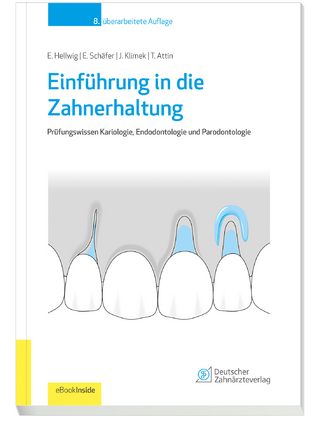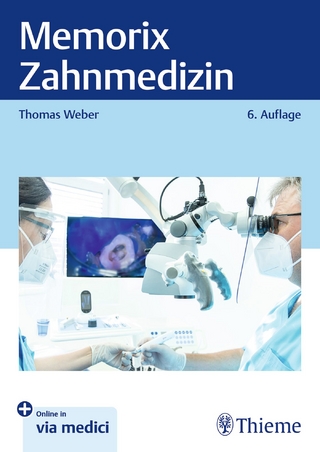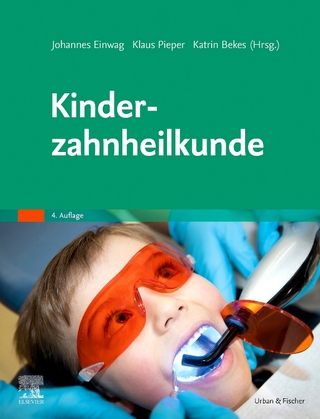Practical Procedures in the Management of Tooth Wear
Wiley-Blackwell (Verlag)
978-1-119-38986-6 (ISBN)
Das anwenderfreundliche Fachbuch fasst übersichtlich die wesentlichen Aspekte jedes Verfahrens zusammen, ergänzt um klinische Bilder. Die Kapitel behandeln die Grundlagen und Vorgehensweisen jedes Verfahrens, enthalten Tipps und Ratschläge für den Klinikalltag sowie umfassende Verweise auf Referenzmaterial. Die Themen reichen von der Patientenanamnese und Diagnose, der Behandlungsplanung spezifischer und allgemeiner Formen der Zahnabnutzung über die Behandlung von teilbezahnten Patienten und das Monitoring der Zahnabrasion bis hin zu Management und Nachbehandlung. Das Fachbuch wurde von international anerkannten Experten mit klinischer und akademischer Erfahrung geschrieben.
- Deckt umfassend und evidenzbasiert das Management von Zahnabrasion ab.
- Untersucht die Epidemiologie und Ätiologie der Zahnabrasion.
- Behandelt praktische Aspekte wie Aufzeichnungen, ästhetische Bewertung, Prävention, klinische Okklusion und aktives Monitoring.
- Bietet Zugriff auch hochwertige Lehrvideos als Ergänzung der Buchinhalte.
- Einzigartige Informationsquelle für Zahnärzte, Studenten der Zahnmedizin höherer Semester und Postgraduierte, die sich auf weiterführende Prüfungen vorbereiten oder sich in der Weiterbildung befinden.
Subir Banerji is a Dental Practitioner, Director of the MSc in Aesthetic Dentistry and a Senior Clinical Lecturer at King's College London Faculty of Dentistry, Oral and Craniofacial Sciences, London, UK.
Shamir B. Mehta is a Dental Practitioner, Deputy Director of the MSc in Aesthetic Dentistry and a Senior Clinical Lecturer at King's College London Faculty of Dentistry, Oral and Craniofacial Sciences, London, UK.
Niek J.M. Opdam is a General Dentist and Associate Professor at the School of Dental Sciences, Radboud University Medical Center, Nijmegen, The Netherlands.
Bas A.C. Loomans is a General Dentist, Assistant Professor and Project Leader of the Radboud Tooth Wear Project at the School of Dental Sciences, Radboud University Medical Center, Nijmegen, The Netherlands.
Foreword ix
Acknowledgement xi
About the Companion Website xiii
1 Introduction and the Prevalence of Tooth Wear 1
1.1 Introduction 1
1.2 Physiological Wear and Pathological Wear: The Concept of Severe Tooth Wear 2
1.3 The Prevalence of TW 4
1.4 An Overview of the Challenges Associated with TW 6
1.5 Conclusion 7
References 9
2 The Aetiology and Presentation of Tooth Wear 11
2.1 Introduction 11
2.2 Intrinsic Mechanical Wear 12
2.3 Extrinsic Mechanical Wear 13
2.4 Non‐carious Cervical Lesions 14
2.5 Chemical Wear 15
2.6 Cofactors 20
2.7 Conclusion 20
References 23
Further Reading 24
3 The Clinical Assessment and Diagnosis of the Wear Patient 25
3.1 Introduction 25
3.2 The Initial Assessment: The Presenting Complaint and the History of the Presenting Complaint 26
3.3 Medical History 27
3.4 Dental and Socio‐behavioural History 29
3.5 Patient Examination 30
3.6 Special Tests 42
3.7 Summary 43
3.8 Conclusion 43
References 48
Further Reading 49
4 The Diagnosis of Tooth Wear, Including the Use of Common Clinical Indices 51
4.1 Introduction 51
4.2 The Use of Descriptive Means to Qualify and Quantify Tooth Wear 53
4.3 The Use of Clinical Indices for the Diagnosis of TW 57
4.4 Conclusion 61
References 65
5 Clinical Occlusion in Relation to Tooth Wear 67
5.1 Introduction 67
5.2 The Concept of the Ideal Occlusion 67
5.3 The Fabrication of Appropriate Study Casts and Records to Enable Occlusal Analysis 70
5.4 How and When to Take the Conformative Approach to Restorative Rehabilitation 80
5.5 How and When to Adopt a Reorganised Approach 82
5.6 The Placement of Dental Restorations in Supra‐occlusion: The Dahl Concept 85
5.7 Summary and Conclusions 88
References 92
Further Reading 94
6 Management of Tooth Wear: Monitoring and Prevention Strategies 95
6.1 Introduction 95
6.2 Counselling and Monitoring 95
6.3 Prevention 98
6.4 Preventive Measures in Case of Chemical Wear 98
6.5 Preventive Measures in Case of Mechanical Wear 99
References 101
7 The Role of Occlusal Splints for Patients with Tooth Wear 103
7.1 Introduction 103
7.2 The Role of Stabilisation Splints for the Management of Tooth Wear 103
7.3 Clinical Protocol for the Fabrication of a Stabilisation Splint: The Conventional Approach 105
7.4 The Use of CAD/CAM for Fabrication of a Stabilisation Splint 107
7.5 The Use of Soft (Vacuum‐formed) Occlusal Splints for the Management of TW 108
7.6 Summary and Conclusion 109
References 113
Further Reading 113
8 Treatment Planning and the Application of Diagnostic Techniques 115
8.1 Introduction 115
8.2 Developing a Logically Sequenced Treatment Plan for a Patient with Pathological Tooth Wear 116
8.3 Forming the Aesthetic Prescription for the TW Patient 121
8.4 The Preparation and Evaluation of the Diagnostic Wax‐Up 124
8.5 Summary and Conclusions 125
References 127
9 Concepts in the Restoration of the Worn Dentition 129
9.1 Introduction 129
9.2 The Additive/Adhesive Approach Versus the Conventional/Subtractive Approach for the Management of Worn Teeth 129
9.3 Concepts in Dental Adhesion 135
9.4 Some Pragmatic Considerations when Attempting to Apply Adhesive Techniques to the Management of TW 140
9.5 Summary and Conclusions 141
References 142
Further Reading 144
10 Dental Materials: An Overview of Material Selection for the Management of Tooth Wear 145
10.1 Introduction 145
10.2 The Use of Resin Composite to Treat TW 146
10.3 The Use of Cast Metal (Nickel/Chromium or Type III/IV) Gold Alloys 153
10.4 Adhesive Ceramic Restorations 154
10.5 Summary 156
References 157
Further Reading 160
11 The Principles and Clinical Management of Localised Anterior Tooth Wear 161
11.1 Introduction 161
11.2 Inter‐occlusal space availability 162
11.3 Restoration of Localised Anterior TW 163
11.4 Summary and Conclusions 179
References 180
12 The Principles and Clinical Management of Localised Posterior Tooth Wear 183
12.1 Introduction 183
12.2 The Canine–Riser Restoration 184
12.3 Techniques for the Restoration of Localised Posterior Wear Using Adhesively Retained Restorations 184
12.4 Restoration of Localised Posterior Wear Using Conventionally Retained Restorations 190
12.5 Management of the Occlusal Scheme When Using Indirect Restorations to Treat Localised Posterior TW (Other than in the Supra‐Occlusal Location) 191
12.6 Summary and Conclusions 193
References 194
13 The Principles and Clinical Management of Generalised Tooth Wear 197
13.1 Introduction 197
13.2 The Prosthodontic Approach to the Restorative Rehabilitation of Generalised Tooth Wear 199
13.3 Conclusions 203
References 205
14 The Prognosis of the Restored Worn Dentition: Contingency Planning, the Importance of Maintenance, and Recall 207
14.1 Introduction 207
14.2 Survival of Direct and Indirect Restorations 208
14.3 Repair and Replacement 209
14.4 Repair Techniques 210
14.5 Conclusions 214
References 216
Index 219
| Erscheinungsdatum | 17.09.2019 |
|---|---|
| Mitarbeit |
Sonstige Mitarbeit: Shamir B Mehta, Niek Opdam, Bas Loomans |
| Verlagsort | Chicester |
| Sprache | englisch |
| Gewicht | 486 g |
| Einbandart | kartoniert |
| Themenwelt | Medizin / Pharmazie ► Medizinische Fachgebiete |
| Medizin / Pharmazie ► Zahnmedizin ► Klinik und Praxis | |
| Medizin / Pharmazie ► Zahnmedizin ► Studium der Zahnmedizin | |
| Schlagworte | Abrasion |
| ISBN-10 | 1-119-38986-0 / 1119389860 |
| ISBN-13 | 978-1-119-38986-6 / 9781119389866 |
| Zustand | Neuware |
| Haben Sie eine Frage zum Produkt? |
aus dem Bereich




